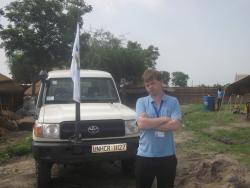Mission Preparedness Training in South Sudan, May 2014

Ours was the second of two trainings that month and we had 21 participants from around the world, almost half being local staff from South Sudan. The goal of the training was to teach us how to work as unarmed civilian peacekeepers in the field. Thus, we were given in-depth knowledge of the power of active nonviolent intervention. The training was given by Robert Rivers (NP Trainer) with support from Ashlyn Exley (NP Area Coordinator for Lakes and Western Equatoria States) and Huibert Oldenhuis (NP Trainer). It took place in a compound rented especially for the occasion, which was in walking distance of NP in South Sudan’s Country Program office. Throughout the training, it alternated between very hot and very wet, so we were able to get acclimatised to South Sudan’s two types of weather.
Before the unarmed civilian peacekeeping (UCP) training, we were lucky enough to receive some training in trauma management from the mental health advisor, Fernanda Krum. She taught us how to deal with our own trauma and how to give psychological first aid to trauma victims. As we are not psychologists, we were taught about what it is possible for us to do and where to leave off for the professionals do their work.
At the beginning of the UCP training, we were given basic safety and security training, such as what to do when there is shooting in the vicinity or if a grenade is thrown in our direction. Also, we were shown where our bunker was for the duration of the training. The bunker is a room with hibernations supplies such as food, water and medical supplies and isreinforced with sandbags to give protection from bullets and other projectiles.
On the first couple of days we were taught what unarmed civilian peacekeeping is and isn’t. It is not passive, it is not non-interventional and it takes courage. To be effective, it is vital to be transparent, build relationships with local actors and to respect their primacy. We did different exercises and role-plays (learn-by-doing) to get a feel for the mind-set of people who are living in violent conflict areas. This process of experiential learning is designed to be transformative, to bring those of us in training to a place where we can feel genuine empathy for the conflict affected communities we work with and to be able to effectively address their immediate protection needs while building their own capacity for sustainable solutions.
Two important points in particular were emphasized to us throughout the training: the “how and why” of conflict analysis and the tools for proactive engagement. To that end, we learned about the root causes, the different stages and the different types of violent conflict. Good conflict analysis is an essential part of the work, for it gives us the information we need to design useful interventions and apply NP’s method of constructive engagement to mitigate the negative consequences of violent conflict.
Throughout the training, we had three different daylong simulations. The day before each of the simulations, the trainers gave us a briefing package that described a fictional conflict in a fictional country. The briefing packages were very thorough, giving the history, culture and current political situations from such ‘countries’ as Anapo and Pacha. We were also given detailed background information of local actors that we would meet. These were played by the trainers and other members of the NPSS team who helped out as resource people. The majority of the compound was also declared “unsafe” and anyone travelling alone was likely to have a very unpleasant encounter with a masked individual (a trainer!) shouting abuse at them with a replica gun. This was to teach us the importance of working together and to make sure that when we are in the field, we do not wander off alone without coordinating with our team. There were many tense moments in the simulations, as difficult situations were thrown at us. We tried to deal with them too, but we sometimes ended up with simulated deaths and detentions! The whole point of training, however, is to have a space where we can learn and experiment where the consequences are not real. By the third and final simulation, we had the necessary know-how to engage with violent conflict constructively.
The ending of the training was a psychological paradigm shift. After eight days of intense learning and rapidly making life-long friends, we were set to be deployed around the country to join the field teams implementing programming, leaving the predictability of the training environment for the challenging world of field work. We ended the training with a party, a banquet of sorts on the final evening. We raised our glasses to toast the passing from a simulated reality to a new, more uncertain one. Over the following few days, we flew out of Juba destined for our new assigned field sites. I was initially deployed to Rumbek in Lakes state and then onto my new home in Waat, northern Jonglei state.
Paul Moloney
